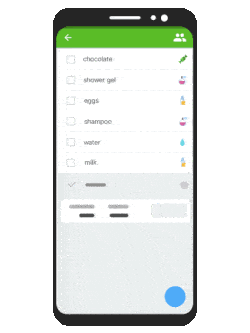Shopping lists have been around for as long as anyone could write, with evidence dating back at least 4000 years old! But why do we make them? Sure, they’re convenient. But did you know there’s a load of psychology behind why we like to make lists. There’s some some surprising mental benefits, too.

Top Rated Shopping List App
Share And Synchronize An Unlimited Number
Of Lists With Others Instantly and Easy
Let us indulge your curiosity about making shopping lists’ mental benefits.
Mental Benefit #1: They Improve Our Memory
This probably doesn’t come as much of a surprise to people, and is probably the most obvious mental benefit.
Our brains are pretty good with memory, and we put a lot of trust in them. But they’re not always perfect. We can guarantee you went to the grocery store without a shopping list and came home to find you’ve forgotten at least one item.
One study has constantly been cited when it comes to shopping lists and memory: Block & Morowitz’s research in the Journal of Consumer Psychology. It found that over 80% of items that are placed on a shopping list are ultimately bought.
“…shopping lists appear to be an effective external memory storage device for grocery purchasing”, says the study.
But it’s not just the mere fact you’ve made a shopping list that helps us remember things. The format which we make shopping list in is also a great help.
That’s because our brains work spatially.
This means that we not only remember pieces of information, we also remember their location. Because shopping lists are very clean and simple it’s very easy for us to remember items by simply recalling their position on the list.
“…it’s hard to memorize through brute force the groceries we need to buy,” says Maria Konnikova in the New Yorker. “It’s easier to remember everything if we write it down in bulleted, or numbered, points.”
Writing and taking a shopping list with you is the most effective way to make sure you get everything you need. But the mere process of making a list makes your groceries more memorable.
So, if you make a list and leave it at home, chances are you’re likely to remember items on the list. Just recall where they were written.
Mental Benefit #2: They Make Shopping Easier
Lists are the perfect way to make a task seem so much more doable. Breaking down a task into smaller tasks means it’s easier for the brain to process it, and helps relieve some stress. It can even “trick” you into being more productive.
Indeed, shopping lists are inherently doing this already. You don’t just put down “spaghetti bolognese” on your shopping list and then try and remember everything you need for it. You break the meal down into its ingredients, which makes the task of shopping to make one a lot easier.
But what also makes the task of shopping easier with a shopping list is because the layout makes it quick and easy for our brains to understand them.
This is because we love to read in an F-pattern.
Several years ago, a piece of research using eye-tracking on webpages, found that readers read in a pattern that roughly resembles an F. This means that at the top of the page they’ll read quite far to the right, but the further down it they go, they less their eyes move right. This research had a dramatic impact on how people write, especially for the internet. This research is often credited/blamed for fueling the rise of “listicals”.
It’s much easier and quicker to look at a shopping list and then know what we need to buy. This is because it fits this F-pattern quite nicely. It’s much simpler than trying to take in a list of ingredients written in paragraph form, saving a lot of time and effort.
Furthermore, shopping lists take away the “Paradox of Choice”.
Sometimes, having too much choice can actually make things more difficult. It causes us to be more dissatisfied with the choice we eventually make. What should we choose? What is the better choice? Apples, oranges, or pears?
A shopping list can make all the decisions we need before we even enter the shop, from the type of cheese we want to what meals we plan on cooking. This means you can shop with focus and intent, making the trip easier and quicker. It can also be a tool in helping you fight sneaky psychological tricks that grocery stores use to make us spend more.

Create Your Own Mobile Shopping List!
- Download the highest rated shopping list app
- Always with you on any device
- Buy exactly what you planned
- Make and share shopping lists together
- See items automatically grouped into categories
Mental Benefit #3: They Help Us Focus Better
As well as helping us keep focus when we’re shopping, one unexpected mental benefit of a shopping list is that it can also help us focus better in the rest of our lives.
A study in 1928 by Russian psychologist Maria Ovsiankina showed that unfinished tasks can produce intrusive thoughts to try and encourage someone to get it finished asap. It shows that our brains constantly hold onto a task until it is completed.
Following on from this, a study done at Wake Forest University in 2011 found that planning can actually help limit the cognitive dissonance caused by uncompleted tasks.
In this particular study, two teams were given a preliminary task to complete before a main one. One team could prepare for the preliminary task, whilst the other couldn’t, but neither team were allowed to finish it.
So, both teams should have experienced interruptions to their trains of thought during the main task, right?
Wrong!
The team that were able to make preparations performed better on the main task compared to the team who weren’t allowed to prepare. This is because the plan assured their brains that the unfinished task was able to be finished later on.
“…a plan reduces the amount of thoughts and attention that are typically recruited in service of an unfulfilled goal. Thoughts of an incomplete goal will not interfere with current concerns so long as a plan has been made to see the goal through later on,” concludes the study.
Making a shopping list means your mind doesn’t need to worry about the shopping anymore. It helps to reduce anxiety regarding shopping. If you make your shopping list in the morning, your brain can forget it for the entire day. Then, you can focus and get on with the rest of your life, uninterrupted, until it’s time to go to the grocery store.
Mental Benefit #4: They Make Us Feel Good
Completing a list is satisfying. Ever finished a to-do list and thought, “Yeah. That’s the stuff. I feel goooooooood”?
Of course you have! It’s human nature.
That’s because your brain literally makes you feel great when completing a task. Even for the smallest of successes, the brain triggers the release of the chemical dopamine which makes us feel elated.
This is one of the reasons where the advice for making a shopping list’s close cousin, a to-do list, is to break tasks down to as many simple ones as possible. Not only does it make the task easier to understand, but all those little releases of dopamine from completing these smaller tasks can greatly help with the motivation to complete your list.
The same goes for shopping lists. If you’ve managed to complete your shopping list in one shop, you’re going to feel damn good about it. Even if you there are some items remaining, you’ll still feel good about the items you have been able to pick up and cross off.
Shopping List Your Way To Happiness
So there you have it. If you’re someone who really enjoys making shopping lists, now you know why. Not only do they have several mental benefits, they’re also good for your mental health.
If you don’t usually make shopping lists, maybe these 4 mental benefits will be enough to encourage you to start making one.
What was the most interesting mental benefit you’ve learned about in this article? Did you know about dopamine? Do you find making a shopping list helpful or a hindrance? Let us know in the comments.
